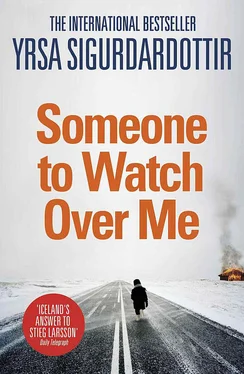Earlier that morning Thóra had called Sogn and spoken to the director about Jósteinn’s attack on Jakob. According to him, the matter was under internal review and decisions were still to be made concerning what measures should be taken. She got the sense that although the attack was serious, Jósteinn was a sick man; after all, he wasn’t at Sogn for nothing. Since the court had found him not criminally liable, the staff had few available options for correction; most likely they would increase the dosage of his medication and place him under stricter supervision, as well as temporarily depriving him of his privileges. The director admitted that these ‘privileges’ were pretty negligible, mainly consisting of allowing him a radio in his room. In other words, there was no axe hanging over Jósteinn’s head, and with his distorted sense of morality you could hardly expect him to repent, or even realize the consequences of his actions.
When Thóra mentioned her own theory about the reasons behind the attack, the man didn’t seem that surprised. Quite the opposite, in fact: he thought it was more than likely. The incident had confounded his staff, given Jósteinn’s supposed friendship with Jakob; none of them had been aware of the two men falling out. Jósteinn himself had revealed nothing, claiming memory loss, which was clearly a lie. The director had asked Thóra whether this meant the petition to reopen Jakob’s case would now be shelved, but she told him that was why she was calling, to determine whether Jósteinn still wished to pursue it. She also told him Jakob’s mother had yet to give a definitive answer about whether she and Jakob still wanted Jósteinn’s backing for the investigation – although Thóra was taking Grímheiður’s lack of response as a ‘yes’. The director offered to ask Jósteinn, since he couldn’t allow Thóra to speak to him on the phone; he was still being held in semi-isolation. He was anxious to explain to Thóra that this isolation was not like segregation in prison: Jósteinn’s daily life was completely unchanged, with the exception that he wasn’t allowed to interact with the other residents or to receive visitors. Thóra accepted his offer with thanks and half an hour later the man called back and reported that Jósteinn definitely wanted to continue the investigation. He had actually seemed alarmed, for the first time since the attack, at the idea that the investigation might be brought to a close.
Afterwards Thóra had contacted Grímheiður and spoken to her for far longer than necessary. This wasn’t Thóra’s choice, but the older woman seemed desperate to share the rationale behind every aspect of her decision; and as she admitted to Thóra, she tended to get confused by her own thoughts, which seemed to move in endless circles instead of lining up neatly. It was different when she talked; speaking required her thoughts to be channelled in a particular direction, making it more likely that they would lead to a specific conclusion. Thóra let her ramble, as clearly this was what she needed to do to get things straight. She had long since lost count of the ‘yes’es and ‘no’s that she’d added to the conversation by the time the woman finally came to a conclusion: it would be best for Jakob if they kept the investigation going, even though accepting Jósteinn’s help went against all her instincts. When the call ended, it turned out to have been worth every minute; a conclusion had been reached – the right one, in Thóra’s opinion. Her other calls were unsuccessful; Ari wasn’t answering the phone, and her random calls to some of the former employees on Glódís’s list had been fruitless. People’s phones were either turned off or they didn’t answer.
The trip to the Regional Office went smoothly, except when Thóra nearly drove onto the pavement in her irritated attempts to turn off the radio. A newsflash had been announced and this had annoyed her for some reason; she couldn’t take any more agitation. She was only one piece of bad news away from having some kind of minor breakdown, and she didn’t want to behave like a madwoman in front of Glódís. Admittedly, it looked as though Glódís was the one heading for a breakdown; she looked a lot worse than when Thóra had last seen her. The black roots of her two-tone hair had inched out even further, and the bags under her eyes didn’t help.
‘Let’s have a seat in my office.’ Glódís didn’t wait for a reply, but turned on her heel mid-sentence and walked away from reception. The secretary who had announced Thóra’s arrival raised an eyebrow and shot Thóra a look that spoke volumes about Glódís’s reputation at the office.
‘I have a lot to do, so let’s get straight to the point.’ Glódís sat behind her desk, adopting an expression not dissimilar to Christ’s on the cross. Her workload seemed not to have diminished at all, even though Thóra would have imagined her position at the Regional Office might have been downscaled. ‘You probably want answers to the questions you sent in your e-mails, which I haven’t had time to respond to, but—’
Thóra interrupted her. ‘I already have them. However, I need to find out where Ragna Sölvadóttir is now. I understand that she’s the girl with “locked-in syndrome” who lived at the residence but escaped the fire.’
Glódís lifted a pencil from the table and tapped it against her palm rhythmically. ‘You can’t know much about the syndrome if you think you’ll get anything out of her in person.’
‘I completely understand her situation and I’m not planning to speak with her in private – I’ll have the assistance of a therapist or someone who’s capable of communicating with her effectively.’
‘It’s not a good idea to upset her, and I see no reason for you to do so. As I’ve said, I’ll answer all your questions – which I’m much more capable of doing than Ragna, since she generally just stares into the middle distance. It’s not like she has anything to add to what’s already come out, so you don’t need to disturb her.’
Thóra didn’t recall Glódís saying that she was going to answer all her questions; in fact her response had been entirely to the contrary. ‘I must insist on meeting her, though I’m certainly very grateful for your willingness to give me more of your valuable time. But as they say, “two heads are better than one”, and your answers have sometimes been a little inconsistent.’
‘What do you mean?’ Glódís was now tapping her palm more forcefully, but more slowly. ‘I’ve been completely open with you – too open, in fact.’
Thóra smiled politely. ‘You didn’t tell me about Ragna, or that Tryggvi Einvarðsson had undergone special treatment that seemed to be having some positive results. I understood from you that Jakob was the only male there capable of moving about freely. Nor did you mention that the night watchman Friðleifur and his friend had been suspected of drinking at work and possibly stealing drugs. Perhaps there are other things you forgot to mention.’
‘None of this is relevant to the fire.’
‘I’ll be the judge of what’s relevant to my investigation.’ If they were to avoid just sitting there bickering, Thóra needed to change her tactics. She had deliberately spoken brusquely, because she wasn’t going to make any progress by listening to half-truths and outright lies. ‘But I must emphasize that I am very grateful for what you’ve told me. I do realize that you’re concerned about those who died, but it simply isn’t fair that their rights should outweigh those of Jakob, who’s still alive.’ She was trying to give Glódís a way out that would encourage her to continue the conversation. Still, Thóra decided to drive the point home a bit further: ‘I could probably get this information from Einvarður, Tryggvi’s father. He has made it clear several times that he wants to be of help to me.’ She didn’t mention that he too appeared to have carefully selected the information that he’d chosen to share with Thóra.
Читать дальше












